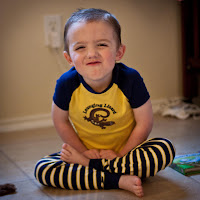So, my mind has been on early childhood music education a lot lately (remember my preschool piano camp?).
 |
| my darling son! |
I think it's probably in large part because I have a three-year-old son who loves music. I loved what Heather Wilson said in her guest post about the seasons of our lives. I feel like in my life and the season I am in right now (being a young mom to a preschooler), my son's age and development seem to be guiding my musical activities a bit....and I love it! I want him to have access to a great music education, if he so desires, and I love teaching these preschool classes that he can attend with me and we can learn and play together!
We have visited the topic of preschool music a lot here lately, but this week I'd like to delve a little deeper (honestly, because I am so interested in this topic right now - hopefully some of you are as well!). I'd like to talk about the different "schools of thought" of early childhood music education this week, and learn a little more about the people who greatly influenced this movement. I also am so interested in all of the different preschool music methods and programs out there, so we might mention some of those as well.
Digging through my old college notes, I have found so many interesting things to re-read and to research a bit. Here are a few quick tidbits, including a little research on musicality in children, and some basic information on the great influences on preschool music (and please click on the links to learn more if you so desire!).
A little research and some facts about musicality in children, by age
Ages 2 1/2-3: recognition and imitation of folk tunes, often in the form of multiple repetitions of learned fragments and variations; by the end of the third year of life a rhythmic structure is learned
Ages 3-4: capable of reproducing an entire song, as far as overall contour goes (accurate pitch is not always possible)
Age 5: able to keep a steady beat, sing an entire song in the same key with an increasing awareness of pitch
"Critical to musical development in the earliest years is the home environment. Opportunities, not just to hear music, but to interact in musical games and activities is critical to emotional and psychological development....It is becoming increasingly apparent that all human beings are biologically predisposed to be musical and that this inborn predisposition for musicality has important consequences for us not only artistically, but emotionally and socially, as well."
Influences on Early Childhood Music
Emile Jaques-Dalcroze (1865-1950)
Basics of his philosophy: full body movement (eurythmic practices), solfege and aural training, keyboard improvisation. Sound can be translated into motion and motion can be translated into sound.
Carl Orff (1895-1982)
Basics of his philosophy: teaching rhythm and melody with speech, singing, movement and percussion instruments; instrument performance and personal expression
Learn more: here
Zoltan Kodaly (1882-1967)
Basics of his philosophy: Music literacy through native folk songs; melodic and rhythmic perception come from use of patterns in singing games and folk songs; solfege
Learn more: here
Now, I would love to hear what specific preschool music programs you teach, have taught, have enrolled your children in or that you have heard about - leave a comment telling us what the program is (whether it be Kindermusik, Musikgarten, Let's Play Music, etc.) and what you like about it!
Labels: Jenny Boster, Preschool Music

